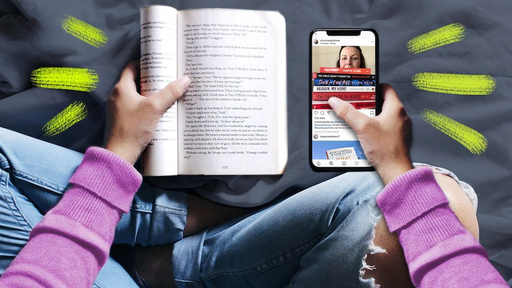
My Accidental Experiment: What Happened When I Replaced Social Media with Books
A couple of years ago, I stumbled upon my local library's ebook app. As a small experiment, I did something simple but transformative: I dragged the Facebook app off my phone's home screen and put the library app in its place, right where my thumb would automatically go.
My theory was that I could reclaim the "in-between" moments—waiting for the bus, standing in the lunch line—for reading instead of scrolling. The results were more telling than I ever expected. In fact, they revealed a few uncomfortable truths about my relationship with my phone.
The first thing I noticed was the twitch.
For days, I would reach into my pocket, pull out my phone, and tap that spot on the screen with a muscle memory so ingrained it was completely unconscious. I was startled every single time to be met not with the familiar blue and white feed, but with a sea of words. It was jarring. I realized that my social media habit wasn't a series of conscious choices; it was an automatic, physical reflex. I wasn't prepared to give a book the actual attention it called for during those moments, but I had no idea just how deep the habit ran until I was forced to confront it, twenty, maybe thirty times a day.
Then came the dawning social awareness. I was at a presentation on criminal justice reform. As it was wrapping up, my attention began to wane. My hand, as if with a mind of its own, started reaching for my phone. But then I stopped and thought: if I had a clunky, physical book with me, would I pull it out and start reading it right now? Absolutely not. That would be obviously, glaringly rude.
A phone, however, provides a clever disguise. It offers plausible deniability. I could be answering an urgent text. I could be checking a work email. But I wouldn't be. I'd just be bored and scrolling. It made me wonder: is being rude okay as long as you can disguise it well?
But the most disturbing realization was one of simple math. I found myself reading a lot more. Finishing novels. Diving into non-fiction. It was wonderful! But the elation was followed by a chilling thought: if I was now reading entire books in the time I used to spend scrolling, it meant that I had previously been consuming books' worth of social media content on a regular basis. The sheer volume of time I had been pouring into that ephemeral stream was staggering.
This experiment wasn't born from a belief that phones are evil. In fact, I came to love ebooks. They are perfect for on-the-go reading, and using my library’s app felt like a modern, efficient way to support a wonderful public institution. This was never about rejecting technology; it was about learning to use it more wisely.
And I’m not alone in this discovery. One person shared a story about being a pack-a-day smoker who would play phone games during smoke breaks. When they quit smoking, they also quit the games and picked up books instead. "I’ve never read so many books in such a short period of time," they wrote. They replaced one habit loop with another, more nourishing one.
The benefits, it seems, go far beyond just "reading more." Another person who made the switch noted how their sleep improved dramatically. They found that if they read on their Kindle app before bed, they could fall asleep much faster than on the nights they scrolled through an infinite social feed. Now, their only sleep problem is when a book is too good to put down—a problem I think we’d all prefer to have.
There’s also a profound mental health component. As one user aptly put it, after deleting social media, they realized "just how much my 'friends'' opinions had been influencing my outlook and moods." Reading allows you to sort by content rather than by people. You choose to dive into a specific world or idea, free from the ambient noise and emotional weight of a thousand curated lives.
So where does this leave us? We live in a world of fractured time. We have the desire for depth but are surrounded by the temptation of the superficial. We hold powerful reading devices in our hands, but their home screens are battlegrounds for our attention.
Making the switch from social media to a Kindle or library app is a fantastic first step. But even then, starting a new chapter in a busy lunch line can feel daunting. This is where we at Nookix see the next evolution of this journey.
We believe in using technology to make profound ideas even more accessible. We take the world's most essential non-fiction books and distill them into engaging, 15-minute audio summaries. Nookix is designed for those very moments the experiment started with—the bus stop, the queue, the short break between tasks. It’s the perfect bridge, a way to reclaim those micro-moments not just for reading, but for focused, powerful learning. It helps you build the habit of choosing growth over distraction.
Ultimately, this journey isn't about shunning social media. It's about intentionality. It's about recognizing the twitch, understanding the opportunity cost, and consciously deciding what you want to feed your mind. It’s about transforming a tool of distraction into a portal for discovery, one page, or one 15-minute listen, at a time.


